#Coronavirus affected
Explore tagged Tumblr posts
Text
covid | WHO China on Covid 19 | COVID19 | Coronavirus | China | who | rajkotupdates.news : corona third wave affect life insurance
WHO lashed out at China on Covid 19, said- why did not disclose Corona data In the year 2020, Covid 19 had knocked. The first case of coronavirus infection was reported in Wuhan city of China. Now the World Health Organization has lambasted China. Image Source: AP WHO slams China on Covid 19 WHO Accuses China: Coronavirus has caused havoc all over the world. Millions of people died due to this…

View On WordPress
#China#Coronavirus#covid#COVID19#rajkotupdates.news : corona third wave affect life insurance#who#WHO China on Covid 19
2 notes
·
View notes
Note
if I were you, I'd get your dang money back from that breeder.
FIP is a random chance event. nearly all cats are exposed during kittenhood to the feline coronavirus, and only in a small percentage of them does it mutate into FIP.
as for the other two pathogens (feline calcivrus and mycoplasma) - I don't know where he picked them up. maybe he came to me pre-diseased, in which case, I'd have a reason to be pissed at the breeder! or maybe he got them on a trip to my parents house. or maybe he got them from the catio. or from the vet's office, when he went in for vaccines and neutering.
FIP messes with the immune system, meaning that affected cats have a hard time fighting off pathogen exposures that a health cat would shrug off with no problem. so it could be that, if not for the FIP, he'd be in perfect health with zero diseases.
tl;dr there are so many unknowns at play that I have a hard time blaming anyone or anything.
#it could be that the breeder fucked me#or it could that I fucked me#or it could be that the universe fucked me#really hard to say for sure
1K notes
·
View notes
Text
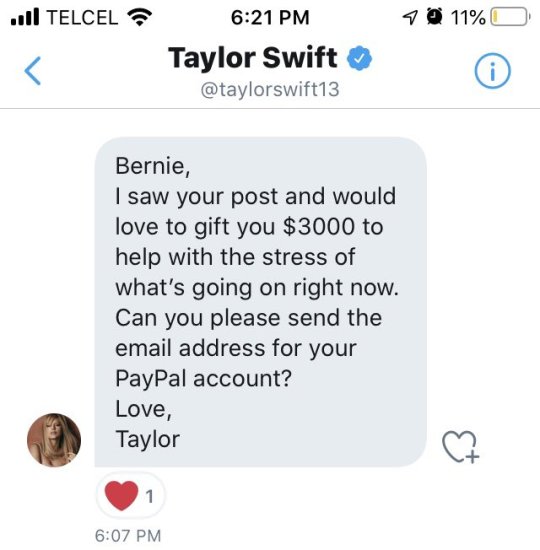
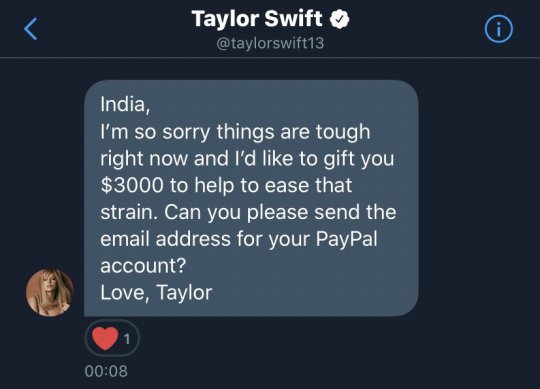
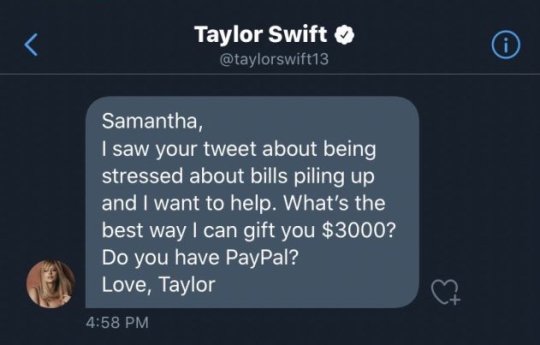
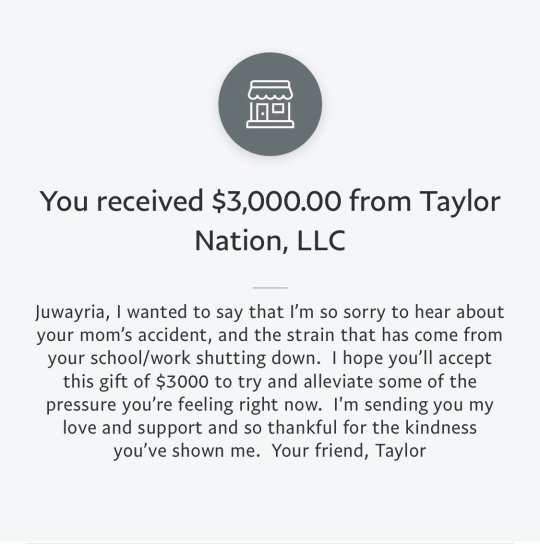


4 years ago today, Taylor Swift helped her fans who had been financially affected due to the coronavirus crisis by reaching out to them and sending them money! (Via ThrowbackTaylor)
417 notes
·
View notes
Text
{ MASTERPOST } Everything You Need to Know about Self-Care
Take care of your body
Why You Should Take a Break: The Importance of Rest and Relaxation
I Think I Need to Go the Emergency Room?
Run With Me if You Want to Save: How Exercising Will Save You Money
Your Yearly Free Medical Care Checklist
Ask the Bitches: Ugh, How Do I Build the Habit of Taking Meds?
Blood Money: Menstrual Products for Surviving Your Period While Poor
On Pulling Weeds and Fighting Back: How (and Why) to Protect Abortion Rights
Ask the Bitches: How Can I Survive in an Apartment with No Heat?
The Expensive Difference Between Recreation and Recovery
Take care of your mind
Our Master List of 100% Free Mental Health Self-Care Tactics
How Mental Health Affects Your Finances
Ask the Bitches: “How Do I Protect My Own Mental Health While Still Helping Others?”
Kurt Vonnegut’s Galapagos and Your Big Brain
Everything Is Stressful and I’m Dying: How to Survive a Panic Attack
Stop Recommending Therapy Like It’s a Magic Bean That’ll Grow Me a Beanstalk to Neurotypicaltown
Making Decisions Under Stress: The Siren Song of Chocolate Cake
Ask the Bitches: I Know How to Struggle and Fight, but I Don’t Know How to Succeed
Update: I Know How to Struggle and Fight, but I Don’t Know How to Succeed
Ask the Bitches: How Can I Absolve Myself of Financial Guilt Over My Pricey PS4?
The Frugal Introvert’s Guide to the Weekend
Take care of your time
Stop Measuring Your Time in Beyoncé Hours
Help! I’m Procrastinating and I Can’t Get Up!
You Won’t Regret Your Frugal 20s
Actually, Fuck Big Goals
How to Insulate Yourself From Advertisements
I’ve Succeeded at Every New Year’s Resolution I’ve Ever Made. Here’s How.
Romanticizing the Side Hustle: When 1 Job Isn’t Enough
8 Free Time Management Systems To Try in the New Year
My 25 Secrets to Successfully Working from Home with ADHD
I Am So Over Productivity Porn
Take care of your career
High School Students Have No Way of Knowing What Career to Choose. Why Do We Make Them Do It Anyway?
The Actually Helpful, Nuanced, Non-Bullshit Way to Choose a Future Career
Woke at Work: How to Inject Your Values into Your Boring, Lame-Ass Job
Are You Working on the Next Fyre Festival?: Identifying a Toxic Workplace
My Secret Weapon for Preparing for Awkward Boss Confrontations
Freelancer, Protect Thyself… With a Fair Contract
I Hate My Job and I Don’t Know How To Leave It: A Confession
A New Job, a New Day, a New Life, and I’m Feeling Good
Season 1, Episode 9: “I’ve Given up on My Dream Career. Where Do I Go From Here?”
How Abusive Workplaces Mirror Abusive Relationships
Take care of your space
How to Successfully Work from Home Without Losing Your Goddamn Mind (Or Your Job)
Leaving Home before 18: A Practical Guide for Cast-Offs, Runaways, and Everybody in Between
Ask the Bitches: I Want to Move Out, but I Can’t Afford It. How Bad Would It Be to Take out Student Loans to Cover It?
How To Maintain Your Car When You’re Barely Driving It
Take care of your people
How Dafuq Do Couples Share Their Money?
Ask the Bitches: “How Do I Protect My Own Mental Health While Still Helping Others?”
How Can I Tame My Family’s Crazy Gift-Giving Expectations?
Ask the Bitches: I Was Guilted Into Caring for a Sick, Abusive Parent. Now What?
Love in the Time of Coronavirus: How to Protect Your Community and Your Soul from COVID-19
Be Somebody’s Eliza with a Simple Yet Life-Changing Act of Kindness
The Ultimate Guide to Helping a Sick Friend
Learning To Reverse the Golden Rule
I Have Become the Rich Relative I Always Wanted
Take care of your financial well-being
Ask the Bitches: How Can I Make Myself Financially Secure Before Age 30?
How to Save for Retirement When You Make Less Than $30,000 a Year
Ask the Bitches: Is It Too Late to Get My Financial Shit Together?
Slay Your Financial Vampires
Should Artists Ever Work for Free?
Don’t Spend Money on Shit You Don’t Like, Fool
How I Learned to Stop Worrying and Love Financial Math
Share My Horror at the World’s Worst Debt Visualization
Stop Undervaluing Your Freelance Work, You Darling Fool
A (Somewhat) Comprehensive List of Fun Job Perks that Won’t Pay Your Rent
We will periodically update this list with newer articles. And by “periodically” I mean “when we remember that it’s something we forgot to do for four months.”
Bitches Get Riches: setting realistic expectations since 2017!
Join the Bitches on Patreon
507 notes
·
View notes
Text
Also preserved on our archive
Whenever you hear someone trying to blame kid's poor test scores "post pandemic" on "lockdowns," show them this.
By Dr. Sushama R. Chaphalkar, PhD.
New research shows that mild COVID-19 alters brain structure and connectivity in key areas responsible for memory and cognition, emphasizing the lasting effects on young people’s brain health.
In a case-control study published in the journal Translational Psychiatry, researchers used magnetic resonance imaging (MRI) and cognitive tests to examine brain structure, function, and cognition in adolescents and young adults with mild coronavirus disease 2019 (COVID-19) compared to healthy controls in a pandemic hotspot in Italy. They identified significant changes in brain regions related to olfaction and cognition, with decreased brain volume and reduced functional connectivity in areas like the left hippocampus and amygdala, which were linked to impaired spatial working memory. Notably, no significant differences were observed in whole-brain connectivity, suggesting that these changes were localized rather than widespread.
Background COVID-19, primarily known for respiratory symptoms, also affects the central nervous system, leading to neurological issues like headaches, anosmia, and cognitive changes. MRI-based studies reveal anatomical brain changes in COVID-19 patients, such as reduced gray matter and decreased volume in regions like the hippocampus and amygdala, often linked to cognitive deficits.
While research mostly focuses on severe cases and older adults, a majority of infections with severe acute respiratory syndrome coronavirus 2 (SARS-CoV-2), the causative agent of COVID-19, occur in adolescents and young adults who also experience long-lasting cognitive symptoms.
This age group, undergoing key brain development, is impacted by changes in spatial working memory and brain structure, which are crucial for cognitive functions shaped by social interactions, significantly disrupted by the pandemic.
Given that this is the largest and most understudied population affected by COVID-19, understanding the brain and cognitive impacts in adolescents and young adults is vital.
Therefore, researchers in the present study compared anatomical, functional, and cognitive outcomes, utilizing a longitudinal design that allowed them to assess both pre- and post-infection differences, in COVID-19-positive and negative adolescents and young adults from Lombardy, Italy, a global hotspot during the pandemic.
About the study The present study involved participants from the Public Health Impact of Metal Exposure (PHIME) cohort, a longitudinal investigation of adolescents and young adults in northern Italy. Between 2016 and 2021, 207 participants, aged 13 to 25 years, were included in a sub-study with MRI scans and cognitive tests. After COVID-19 restrictions were lifted, 40 participants (13 COVID+ and 27 COVID−) participated in a follow-up study, which replicated the MRI and cognitive assessments.
The mean age of participants was 20.44 years and 65% were female. COVID+ status was confirmed through positive reverse transcription polymerase chain reaction (RT-PCR) tests within 12 months of follow-up. Neuropsychological assessments used the Cambridge Neuropsychological Test Automated Battery (CANTAB) to evaluate spatial working memory.
MRI and functional MRI data were acquired using a 3-Tesla scanner, processed, and analyzed for structural and local functional connectivity using eigenvector centrality mapping (ECM) and functional connectivity (FC) metrics. Whole-brain functional connectivity metrics showed no significant differences between COVID+ and control groups, indicating that the observed changes were specific to key brain regions rather than generalized across the entire brain.
Statistical analysis involved the use of pairwise Student's t-tests, Kolmogorov–Smirnov test, linear regression, two-waves mediation analysis, negative binomial regression, and linear regression, all adjusted for covariates.
Results and discussion Significant differences were observed in the two groups regarding the time between assessments, COVID-19 symptoms, and vaccine status. The research identified five localized functional connectivity hubs with significant differences between the two groups, including the right intracalcarine cortex, right lingual gyrus, left frontal orbital cortex, left hippocampus and left amygdala, which is vital for cognitive functions. Only the left hippocampal volume showed a significant reduction in COVID+ participants (p = 0.034), while whole-brain connectivity remained unchanged, reinforcing the localized nature of the brain changes.
The left amygdala mediated the relationship between COVID-19 and spatial working memory "between errors" (p = 0.028), a critical finding that highlights the indirect effect of amygdala connectivity on cognitive function in COVID+ individuals. This mediation analysis underscores the role of specific brain regions in influencing cognitive deficits, as only the indirect effect was statistically significant for spatial working memory errors. The orbitofrontal cortex, involved in sensory integration and cognitive functions, also showed decreased connectivity in COVID+ individuals, supporting previous findings of structural and functional changes in this region during COVID-19.
The study is limited by small sample size, lack of diversity, potential confounding factors due to the long interval between MRI scans, treatment of certain subjects as COVID-negative based on antibody testing beyond the 12-month threshold, and the possibility of non-significant findings in mediation analysis due to these factors.
Conclusion In conclusion, the findings indicate persistent structural and functional alterations in specific brain regions of COVID-19-positive adolescents and young adults, including changes in gray matter volume and localized functional connectivity, which correlate with diminished cognitive function, particularly in working memory.
Further research is necessary to evaluate the longevity and potential reversibility of these brain and cognitive changes post-infection, enhancing our understanding of post-COVID outcomes and informing future interventions and treatments. The longitudinal design of this study, with pre- and post-COVID data, strengthens these findings by allowing direct comparisons over time, offering robust insights into the impact of COVID-19 on adolescent brain development.
Journal reference: COVID-19 related cognitive, structural and functional brain changes among Italian adolescents and young adults: a multimodal longitudinal case-control study. Invernizzi, A. et al., Translational Psychiatry, 14, 402 (2024), DOI: 10.1038/s41398-024-03108-2, www.nature.com/articles/s41398-024-03108-2
#mask up#covid#pandemic#covid 19#wear a mask#public health#coronavirus#sars cov 2#still coviding#wear a respirator#long covid#covid conscious#covid is airborne#wear a fucking mask
151 notes
·
View notes
Text
EMERGENCY - If you have been affected by Covid-19 and/or LOST a loved one to Covid-19 (Coronavirus)... please listen to what I am about to say...
Do you remember the year of 2020 and when coronavirus broke out?
Do you remember Donald Trump telling the GENERAL PUBLIC that Coronavirus was FAKE? Do you remember his rhetoric about how coronavirus was the government's excuse to keep you in your house so they can take over the country?
These were the types of things that happened DURING ONE OF OUR COUNTRY'S MOST DEVASTATING TIMES... He DIVIDED us and started chaos!!!
Think of all the innocent and wonderful lives that WERE LOST FROM CORONAVIRUS!!!
Thousands and thousands of individuals BELIEVED Coronavirus was fake, because Trump wanted people to believe it! And thousands and thousands had DECIDED to NOT get vaccinated.
Please... DO NOT FORGET HOW THINGS WERE WHEN TRUMP WAS IN CONTROL AND DO NOT FORGET HIS NON-SENSE ALLEGATIONS!!
And...
Don't you DARE let those that died from Coronavirus BE FORGOTTEN!!!
Please.... do NOT vote for Donald Trump!!
ANYBODY would be a better option than Trump!!
Please VOTE!!!
(My "Freedom of Speech" is being violated IF I CANNOT BLAZE THIS!)
80 notes
·
View notes
Text
This was in main stream media 4 years ago. It seems nobody cared.
Stroke surge
"Reports of strokes in the young and middle-aged — not just at Mount Sinai, but also in many other hospitals in communities hit hard by the novel coronavirus — are the latest twist in our evolving understanding of the disease it causes. The numbers of those affected are small but nonetheless remarkable because they challenge how doctors understand the virus. Even as it has infected nearly 2.8 million people worldwide and killed about 195,000 as of Friday, its biological mechanisms continue to elude top scientific minds. Once thought to be a pathogen that primarily attacks the lungs, it has turned out to be a much more formidable foe — impacting nearly every major organ system in the body."
55 notes
·
View notes
Text
Evidence is mounting that Europe’s far right will score better than ever before in the upcoming European Parliament elections on June 6 to June 9—and that the continent’s young voters will fuel its ascent. The young adults now gravitating to far right aren’t Nazis or xenophobic racists, but they may have a hand in an outcome that will, at the very least, shift the European Union’s priorities and accents to the right. A particularly solid right-wing finish—and cooperation across the hard-right spectrum—could rattle EU unity and throw a wrench into the bloc’s workings at a time when it is confronting acute crises on several fronts, not least the war in Ukraine.
Since new laws mean that even people under 18 will be eligible to vote in some countries—16-year-olds in Austria, Germany, Malta, and Belgium, and 17-year-olds in Greece—there had been hope that these new voters would put a brake on the populist surge engulfing Europe. The idea behind giving 16- and 17-year-olds the vote was partly based on their long-term investment in politics. The policies designed today will affect them for many decades, in contrast to their grandparents.
And in the 2019 European Parliament election, young voters showed great promise by turning out in record numbers, a hopeful sign that reflected their enthusiasm for the common European project. With the climate movement rocking the streets, their votes went disproportionately to green parties that championed strong climate protection and deeper EU integration—two sets of long-term interests. This landed green representatives from Portugal to Latvia in the Brussels parliament and prompted the EU administration to approve the European Green Deal in 2020.
But the democratic exuberance of voters in their late teens, 20s, and early 30s could boost a very different trend this June, as growing numbers of younger voters are siding with far-right populist parties—the very ones that want to scupper the Green Deal and rein in the EU. In recent national votes conducted in Portugal, Sweden, the Netherlands, Italy, Finland, and France, young people voted in unprecedented numbers for extreme nationalist and euroskeptic parties. (Though some observers have argued that reporting about these trends is incomplete or oversimplified.) And surveys in Germany show the youth vote becoming ever more sympathetic to the Alternative for Germany (AfD), a far-right party that has undergone a radicalization that makes it among Europe’s fiercest, hard-right electoral parties.
“There’s no doubt that these parties have been making inroads to younger voters,” said Catherine de Vries, a Dutch political scientist. “The parties don’t look so extreme anymore, as they’ve been around for a while now. And young people think that the mainstream parties have had their chance. The system still doesn’t work for them, so let the other guys have a try.”
A German study published this year by a team led by youth researcher Simon Schnetzer showed that a full 22 percent of the young people (in this case, ages 14 through 29) surveyed would vote for the AfD if German elections were held today—twice as many as just two years ago. The tally for the Green Party fell by a third during that time frame. A full quarter of those asked said they weren’t sure who’d they vote for—another all-time high result.
The grounds for the pronounced shift are vague: Researchers tend to cite a general unhappiness with the post-pandemic economic and political conditions. “It seems as if the coronavirus pandemic left [young people] irritated about our ability to cope with the future, which is reflected in deep insecurity,” wrote the study’s authors. The issues described by participants that most impact this insecurity included their personal finances, professional opportunities, the health sector, and social recognition. They expressed less concern about the climate crisis and more about inflation, the economy, and old-age poverty.
“We can speak of a clear shift to the right in the young population,” said Klaus Hurrelmann, one of the study’s authors and a professor at the Hertie School in Berlin. The AfD’s foremost campaign priority of stopping immigration and refugee relief plainly struck a chord: Compared to a separate study conducted five years ago, about half as many (26 percent) of the young participants (26 percent) in the 2024 study said they were not in favor of taking in refugees. But just as important as the content of immigration policies, the authors underlined, was the idea that young people feel unheard or involved in the political process.
The change in sympathy in many young Germans reflects survey results, elections, and the statements of other young people across Europe. In the Netherlands’ elections last year, the most popular party among people under 35 (at 17 percent) was the Party for Freedom, led by Geert Wilders, a far-right populist with a long record of EU-trashing.
The explanation provided by many Dutch experts: It’s all about bestaanszekerheid, a Dutch word translated as “livelihood security.” This refers to having a decent and regular income, a comfortable home, access to education and health care, and a buffer against unexpected problems, de Vries told the Guardian. Young peoples’ leading concerns in the Netherlands are housing, overcrowded classes, and struggling hospitals, she said, which Wilders addressed in his campaign.
In Portugal’s March legislative elections, the far-right Chega party, which prioritized courting young people, raked in more of their votes than any other party. The meaning of chega, which can be translated as “that’s enough,” accurately describes many young voters’ motive for supporting it. Their gripes: “a very low average wage and an economy that cannot absorb educated young people,” according to political scientist António Costa Pinto in an interview with Euronews
“In the past, right-wing sympathizers accused immigrants of taking their jobs,” said Eberhard Seidel, the managing director of a Berlin-based nongovernmental organization called Schools Without Racism. “Now there are enough jobs but not enough housing for people who work. They still have to live with their parents.”
Observers say that the far right has excelled at grabbing the youth’s attention, not least with the social media platform TikTok. The recent German study found that 57 percent of young people imbibe their news and politics through social media. More than 90 percent use messaging service WhatsApp, followed by Instagram (80 percent) and YouTube (77 percent). TikTok stands at 51 percent; more than half of all 14- to 29-year-olds now use the app regularly, compared to 44 percent last year. The epiphany prompted an immediate response from German Health Minister Karl Lauterbach, who on declared in his first video on the platform, posted on March 19: “Revolution on TikTok: It starts today.”
Other opinion surveys show that young voters are diverse, divided, and undecided. A YouGov poll conducted in August 2023 showed that young Europeans are overwhelmingly concerned about the climate crisis and its likely effects, and more willing than older people to change behavior to mitigate those effects. Another poll, conducted in Germany, showed human rights violations at the top of younger people’s lists, followed by climate change, sexual harassment, and child abuse.
Younger voters still aren’t the drivers of xenophobia in the way that their parents’ generation was, Seidel said. A vote for the AfD doesn’t necessarily mean that they favor expelling immigrants from Germany or exiting the EU. “They take the basics of democracy and the social system for granted,” he said. “And they’re not fully aware of the implications of a rightward lurch in their political systems.”
Neither were Brexit’s voters, Seidel noted. And they found out the hard way.
66 notes
·
View notes
Text
What Is Long COVID? Understanding the Pandemic’s Mysterious Fallout > News > Yale Medicine
Originally published: April 15, 2024. Updated: June 4, 2024
Just weeks after the first cases of COVID-19 hit U.S. shores, an op-ed appeared in The New York Times titled “We Need to Talk About What Coronavirus Recoveries Look Like: They're a lot more complicated than most people realize.”
...
Unlike most diseases, Long COVID was first described not by doctors, but by the patients themselves. Even the term “Long COVID” was coined by a patient. Dr. Elisa Perego, an honorary research fellow at University College in London, came up with the hashtag #LongCOVID when tweeting about her own experience with the post-COVID syndrome. The term went viral and suddenly social media, and then the media itself, was full of these stories.
Complaints like "I can't seem to concentrate anymore" or "I'm constantly fatigued throughout the day" became increasingly common, seemingly appearing out of nowhere. With nothing abnormal turning up from their many thorough lab tests, patients and their physicians were left feeling helpless and frustrated.
The World Health Organization (WHO) has defined Long COVID as the "continuation or development of new symptoms three months after the initial SARS-CoV-2 infection, with these symptoms lasting for at least two months with no other explanation." This deliberately broad definition reflects the complex nature of this syndrome. We now understand that these symptoms are wide-ranging, including heart palpitations, cough, nausea, fatigue, cognitive impairment (commonly referred to as "brain fog"), and more. Also, many who experience Long COVID following an acute infection face an elevated risk of such medical complications as blood clots and (type 2) diabetes.
In April 2024, an estimated 5.3% of all adults in the United States reported having Long COVID, according to the Centers for Disease Control and Prevention (CDC). Data from the CDC suggest that Long COVID disproportionately affects women, and individuals between the ages of 40 and 59 have the highest reported rates of developing this post-acute infection syndrome.
...
Inderjit Singh, MBChB, a YSM assistant professor specializing in pulmonary, critical care, and sleep medicine, and director of the Pulmonary Vascular Program, is actively engaged in clinical trials aimed at uncovering the fundamental underpinnings of Long COVID.
...
Through this work, a significant revelation emerged. They observed that patients grappling with Long COVID and facing exercise difficulties were unable to efficiently extract oxygen from their bloodstream during physical exertion. This discovery identifies a specific cause underlying the biological underpinnings of Long COVID.
... Dr. Singh, along with other researchers, is focused on the identification of blood-based markers to assess the severity of Long COVID. For example, a research group, led by Akiko Iwasaki, PhD, Sterling Professor of Immunobiology and Molecular, Cellular, and Developmental Biology, and director of the Center for Infection & Immunity at YSM, most recently created a new method to classify Long COVID severity with circulating immune markers.
Further investigations conducted by Dr. Singh's team identified distinctive protein signatures in the blood of Long COVID patients, which correlated with the degree of Long COVID severity. Researchers identified two major and distinct blood profiles among the patients. Some of them exhibited blood profiles indicating that excessive inflammation played a prominent role in their condition, while others displayed profiles indicative of impaired metabolism.
...
Researchers currently believe that the impairment of a spectrum of key bodily functions may contribute to these diverse symptoms. These potential mechanisms include compromised immune system function, damage to blood vessels, and direct harm to the brain and nervous system. Importantly, it's likely that most patients experience symptoms arising from multiple underlying causes, which complicates both the diagnosis and treatment of Long COVID.
...
The last word from Lisa Sanders, MD:
I’m the internist who sees patients at Yale New Haven Health’s Multidisciplinary Long COVID Care Center. In our clinic, patients are examined by a variety of specialists to determine the best next steps for these complex patients. Sometimes that entails more testing. Often patients have had extensive testing even before they arrive, and far too often—when all the tests are normal—both doctors and patients worry that their symptoms are “all in their head.”
One of our first tasks is to reassure patients that many parts of Long COVID don’t show up on tests. We don’t know enough about the cause of many of these symptoms to create a test for them. The problem is not with the patient with the symptoms, but of the science surrounding them. If any good can be said to come out of this pandemic, it will be a better understanding of Long COVID and many of the other post-acute infection syndromes that have existed as long as the infections themselves.
#covid#long covid#article#research#study#akiko iwasaki#lisa sanders#yale medicine#2024#june 2024#summer 2024#long covid research#inderjit singh
46 notes
·
View notes
Text
Insane and brain-dead.
pairing-Simon 'Ghost' Riley/You. Very little John 'Soap' MacTavish/You
Chapter WARNING- Description of blood, cruelty, tin.swearing, partial description of decomposition, mention of suicide. My vision of the characters
Summary - 'There is no love'-that's what Simon thinks. BUT what if two traumatized and mentally wounded people meet in a hellish apocalypse and find solace in each other?Hundred what if what happens to them connects them?.
(the end will be good)
This is the first, introductory chapter.
Part one.
It is no secret that viruses and bacteria mutate at an amazing rate, either changing their genetic code and causing mutations, or changing so much that there is already a problem of a new strain. Today, viral mutation is a common phenomenon that does not scare people in the least. Many people do not even think that someday this microorganism can cause harm, ignoring all those stories of fatalities, great and terrible epidemics that have happened to mankind, naively believing that if it happened a thousand years ago, it certainly will not affect you.
How many people know about the Antonine Plague? Although, by the way, it was the most horrifying epidemic in history, which killed more than 5 million people, and according to records, killed 2 thousand Romans a day.And the bubonic plague? It's frightening when you think of the descriptions in books: fever, nausea, hallucinations, pus-filled buboes, death, and people in bird masks. So what? That's right, nothing. Remember when the coronavirus wasn't taken seriously? A lot of people thought it wouldn't reach the regions, states and cities, but it did.
Just like this time, no one took it seriously when dozens of reports were projected from a small town about a sudden outbreak of "rabies", forcing the sick to die in hellish agony within minutes, and then rising up like stereotypical zombies to bite everyone they came across, succumbing to the virus' natural call to multiply.
Really, who'd believe it? And for nothing. After the first newscasts, a wave of memes and jokes started among the schoolchildren, while the adults, lost in the cycle of work, family, and household chores, paid no attention as the small town of Corrins struggled to cope with the sudden and unknown threat. The town government was going crazy-people were refusing to work, refusing to go outside, and even the patrolmen were going on strike. But the infected were unstoppable. Even a hundred people were already tangible, and where there were a hundred, there were a thousand people, and where there were a thousand, there were two.The city was slowly dying until no one took it seriously. Why didn't anyone move out? The answer was simply that they couldn't. Corrins was quarantined, a total lockdown, no entry or exit. When did that ever work? There's not even a movie where a flimsy gate and guards stopped a horde of infected.
The infected huddled together, roaming the streets like mindless, attacking anyone they could catch.
The virus was spreading as fast as anyone could have imagined, and seemingly in ways never before recorded in history. In just a week, the city of Corrins had fallen into oblivion, along with three other towns in the vicinity, followed by the entire region.
Dim light shone through the thick navy-colored curtains, softly illuminating the room. Simon Riley, a former British mercenary who had just awakened from another night of nightmares, sat in the kitchen chair, leaning back casually, foot on foot and hand under his head, staring into the void. For the third time he was dreaming episodes from his past. Dreams about his goat father no longer frightened him, no longer made him nervous like the dreams about the team that Simon had grown accustomed to during his ten years on the job. Now, after the severe injuries, the difficult and sometimes deadly missions, the adrenaline that bubbled in his blood day and night, life in retirement seemed like hell. For the first few days he, like his guys, was in a depressed mood, not understanding why they were forced to retire so early, but none of the superiors explained anything, giving a completely stupid answer that was the same for everyone: "We changed priorities". That day was hard for everyone. but, nevertheless, the guys did not forget each other. Living in the same city, they often gathered in the bar "Ricky and Mickey", discussed personal matters, tried to rebuild their lives on a new way. And for Riley, worrying about what to cook, trying to build relationships, job hunting, and constantly changing activities were hated, so his thoughts often returned to the days when he and John and the guys worked together. When adrenaline was bubbling in his blood and his brain was working on emergency decisions and tactics. Being on the rope gave life an unrealistic drive, helping him forget the horrors of his childhood. Sometimes, however, he was afraid - those were the rare occasions when things didn't go according to plan and his companions could get hurt. Simon wasn't afraid for himself, he wasn't afraid of bleeding out on the battlefield, getting shot, or even losing a leg or an arm, but the image of a bleeding comrade made him shudder inwardly, still vivid in his mind's eye: He'd been shot in the head-unfortunate and nearly fatal, if it hadn't been for the plate in his skull-the miracle that had saved Johnny from certain death in this cold and filthy place.
That day Simon Riley almost died for the third time. The first time Riley had experienced such deep emotions was in his childhood, when his father, an alcoholic and deeply addicted to drugs, had mocked him. The image of his father with a viper in his hand and the devil-like image of his older brother would haunt Simon's dreams and visions for a long time. The second time it was the image of his mother. The fragile woman who was pulling the whole family on her own back, tolerating her abuser of a husband day after day, humbly going to hard work, trying to earn at least some pennies, couldn't stand it and put a bullet in her temple. She lay on the old and creaky couch for almost twenty-four hours before her husband paid attention. Simon remembers like yesterday her small, thin body lying stiff and stiff on the couch, with a humble face like a painting of The Death of the Virgin Mary by the artist Caravaggio. She was dressed in her pale pink robe, and her thin hand rested on her breast. Mrs. Riley tried her best to hold on for little Simon's sake, but she could not endure her eldest son's abuse and her husband's hatred, killing herself and finally achieving the peace and quiet she so desired. Little Simon sat with her all day, trying his best to wake the lying woman, covering her face with a damp cloth, gently stroking her icy hands. He was only six years old then, when he stood over the pit where the old wooden coffin containing the body of his beloved mother lay.
And then, when Johnny had been injured, Simon felt again like he did then at six years old, next to his mother. He, lost in emotion, grabbed Johnny's head, his hands trying to cover the bullet wound, roughly grasping like a child trying to help as best he could. The ghost doesn't remember Price dragging him away from Johnny's unconscious body, giving room for the paramedics to arrive.
John 'Soap' MacTavish was taken to the medical unit and underwent emergency surgery, Sitting in the dark and empty corridor, Ghost was out of breath as Gaz and Price tried to support him. "John's a tough guy, he'll get over it." And the this jerk turned out to be fucking resilient. And lucky too.
After that the band didn't last long-quite a couple months later they were dismissed, without reason or much explanation, taking them out of their positions. Of course no one expected it, but what was to be done?
Simon picked up his phone, checking messages, secretly hoping for another invitation to a bar, just to avoid the domestic routine, but instead of the pleasant words "let's go for a cognac," he came across a sweet and sweet message from Amanda, the girl Ghost had tried to meet at his leisure, when Soap was once again blowing his mind about the need for a relationship.Amanda was undeniably beautiful-blonde curls, blue eyes, and charmingly pouty lips, but the problem was that as soon as she opened her mouth, everyone wanted to shut her up. Amanda Hess was a meticulous Shopping Fanatic, and "miss fucking amazing ideas." In places, undoubtedly, the idea of going to fuck in the park at one o'clock in the morning excited Simon, but frankly, he lacked enthusiasm, and for the fifth time, hearing an unusual idea, his eyes involuntarily rolled with stupidity.
Simon and Amanda had been talking for about three months now, and he didn't know if he liked her or if he liked her ass, or if he even needed these dates.
"Honey, can you pick me up at eight pm?" -said the message, and attached to it was a nude photo of a girl sitting on the edge of a bed with her feet up and taking a picture of herself through a mirror, wearing only black lace lingerie. Beautiful, but unimpressive. When you see the same tits and hear the same things, you get used to it and the panties photo is no longer arousing. Inwardly Simon wished for soulfulness and some kind of domestic affection, maybe a cozy lady dressed in his huge warm sweater and striped socks, making hot chocolate.
"I'm busy," Simon answered rudely but habitually, but no sooner had he sent a message back than someone slammed the front door, forcing him to look up and away from the phone.
"Fuck," Soap said, panting and trying to catch his breath, leaning his hands on the walls. His eyes darted around the room, searching for the scowling lieutenant and finally seeing his comrade, Johnny rushed over to him, speaking quickly and nervously. "Hey L.T., did you see what the fuck is going on? We're fucked, we're fucked up a bloody fucking ass that can't be compared to Makarov's ugly face."
Simon grinned wryly as he listened to MacTavish and sat just as casually in the kitchen chair, watching Mr. Mohawk walk around his kitchen, looking for the TV remote and finally finding it, turning it on as he continued to mutter-"Fucking lunatics flooding the streets! I thought I'd never bloody get to you-the police are shutting down the city, ambulances everywhere!"
And as John spoke, Simon lowered his gaze to the phone again, wistfully noting that Amanda's message was from yesterday and apparently he hadn't noticed it. Soap snatched the phone out of Simon's hands, carelessly tucking it away on the table, speaking seriously, frowning his bushy eyebrows. "Buddy, can you hear me? I'm dead serious right now."
"You can't be serious about piles of zombies roaming the street," Riley replied, looking up at his friend again. Behind him, while no one was paying attention, the coffee was frothing, running off and dirtying the stove, leaving a bitter burnt odor that Simon sensed and immediately moved the coffee pot. "Bloody hell, John."
"Leave your fucking coffee, this isn't a joke, Lieutenant," John shrieked, finally turning his attention back to Simon.
On TV, a slender girl in a business suit with a serious face and a monotonous voice was giving an interview; in the background, behind her were several police cars, ambulances, and even a SWAT team flashed in the frame. Somewhere very far away there were shouts of people, special forces, passing information to each other. The girl's voice was steady and didn't even shake as she broadcast almost robot-like.
"Today, around six o'clock this morning, a group of unknown assailants attacked the locals. It's probably an outbreak of rabies. The patients have pale skin, cloudy eyes with red spots and gritted teeth, some cases of hemoptysis, poor coordination and slurred speech. If you find such symptoms in yourself or your relatives, call the number 'xxx-xx-xx-xxx'. We urge all citizens to stay in their homes until the next announcement. You are also reminded to lock your windows and doors and do not let anyone suspicious in."
"You heard her, it's just an outbreak of rage," Simon waved his hand nonchalantly, to which John, eyes wide, shouted again, trying to reason with his colleague.
"You don't fucking understand." -MacTavish clutched the remote tighter, rewinding the videotape of the interview to the very end.
"I don't understand what?" -Ghost raised his eyebrows skeevily.
"She's dead"-John said sharply, including the very end of the video, where a man in an ambulance corpsman's uniform comes at the journalist from behind. He sinks his teeth into her neck, biting off a large chunk almost immediately, his bloody hands grasping her shoulders as the girl screams frantically. Simon's eyes slowly open as his brain's mechanisms process the information. It's as if he believes it, but the other half of him screams "It's all a lie, a joke. April 1." Unconsciously he looks at his phone, checking the date and realizing to his horror that the first of April is long gone and it was June. The information and realization pressed on his brain, causing goosebumps to crawl across his skin. A slight fear bubbled in his stomach as he watched Soap's actions as if mesmerized. John frantically opened every drawer in the kitchen, looking for any canned goods and bars.
"Shit, LT, what are you eating? Don't you have any?!" exclaimed Soap, panic-rushing through the rooms while Simon came to his senses.
"Bottom drawer on the right"-as Riley answered mesmerized. John, opening the cabinet and seeing five cans of canned chicken and pork, exhaled, immediately pulling them out and placing them on the table.
"Don't delay, Ghost, get the damn things together. I was able to get a hold of Price, he and Gaz will be waiting for us on the outskirts of town at the cottage plots. Price is trying to contact Laswell and the department." Soap rummaged through the drawers, pulling out matches, knives, and anything else he thought might come in handy. Recovering and hearing shouts outside the door, Simon jumped up and immediately began grabbing his belongings and dumping them at speed into his hiking backpack. The screams were getting closer and it seemed like the entire apartment building was shaking with people running, panicking and screaming. Simon's apartment was right in the middle of the building, on the fifth floor, and it was damned inconvenient.
At last, Ghost jerked the curtains aside carelessly, peering out the window and watching in horror at the sheer chaos. He had never seen anything like this even in the army. From the neighboring apartment building, people were falling from the balconies, one was already infected, and the other, Simon's acquaintance, Edgar, a man with three loans and perpetually bawdy jokes, had thrown himself out of the window, not wanting to fight, nor to be infected and converted. Unwittingly, Simon remembered how they'd sat at the bar and the jerk with the black, curly beard would see any girl off with a meow, stretching out his catchphrase, "Your pussy's in danger next to me." Then, for Riley, it was a show, at the end of which Edgar was guaranteed to get slapped by some extravagant girl.Now he was dead. In the sky we could see helicopters crashing one after another, one of them crashing right into the house, partially destroying the building. The wreckage flies down where the crowds are, and at first glance it's hard to see what the crush is all about: screams and heartbreaking cries from everywhere, and the special forces are trying to get everyone out of the way, but they, too, the men in uniform and ammunition, suffer the same fate as the civilians - to be bitten. Suddenly Simon is yanked away from the window. Jonny, hearing something going on outside the apartment, realizes it's time to run. - "Damn! We're all going to die in here!"
The ghost followed Soap, and as the other opened the door, the growling grew louder. At the end of the corridor was a small flock of zombies - apparently residents of neighboring apartments that were infected.Without thinking long, the Comrades rushed to the stairs-an escape route. Suddenly, the door swings open in their faces and an older woman falls out into the hallway with a loud hiss. John reflexively shoves the old woman away from him, and Ghost reflexively hits her with the bat he'd brought just in case. "Oh bloody hell, I'm sorry Mrs. Ruzzet," Simon says nervously as he hurries forward, almost flying down the stairs, missing the steps. The zombie old lady lets out another clanking of teeth as she tries to crawl after them, but they've already broken away. Floor after floor flies by at speed, with only a door ahead. John pushes that one open, but it's like it turns out to be locked. "The fucking lock's jammed, Simon, help!" The sounds of zombies are coming closer, and Riley could swear she can hear them dragging their feet on the floor. Strike one. Nothing happens. Second strike. The smell of stinking zombies is getting closer and old Ruzzie is already sliding down the stairs with broken legs, dragging herself with her arms. Third strike. Simon stands behind Soap with bat in hand, the wooden handle cracking from his grip. Four. The door opens and John reflexively grabs Simon by the collar of his shirt, pulling him outside.
It's fucked.The smell of burning, blood and decomposition was everywhere, the dead trying to get to the last survivors who dared to go outside. A girl ran past Simon, clacking her high heels with a loud squeal while three well-fed zombies with bloody mouths with blood dripping from them, staining their clothes, almost ran after her. John rushed towards the cars, picking his way through them with a slight ducking, while Ghost followed behind him, looking back and keeping an eye out for single zombies. The path through the yard was relatively clear, if it weren't for a pack of zombies in suits crouching over a corpse and ripping apart their once office colleague. "That's what 'eating the boss's brains out' means," John grinned grimly, and Simon only chuckled.
"We can walk along the edge and hope the bastards are too focused on their coworker," Simon suggested, and John nodded, slouching, hunching over and almost pressing himself against the wall. The zombies, too focused on their food, wouldn't have noticed him if it hadn't been for John's sudden cry of, "Fuck!" With a snarl, they turned their heads toward the living humans, slowly rising, moving their hollow-headed bodies forward. Simon turned to John, who was swearing to himself as he tried to kill the crawling zombie: it was half a body, the upper half, and from the stomach on up, there was nothing, just part of the spine, but it was tough. Hurriedly, Simon grabbed his friend by the wrist and swiftly dragged him away from the alley.
They made their way to the outskirts of the city, but they couldn't stop there because all the neighborhoods were crawling with zombies.
"I'm damn glad your attraction to life on the outskirts cut us a hell of a lot of slack. It wasn't as shitty when I got to you as it is now," John tried to catch his breath. How many kilometers had they run? It wasn't clear, but it was a lot, though they were used to long runs, and their goal was to get to Price's country house as fast as possible, even if it was a hell of a long way.
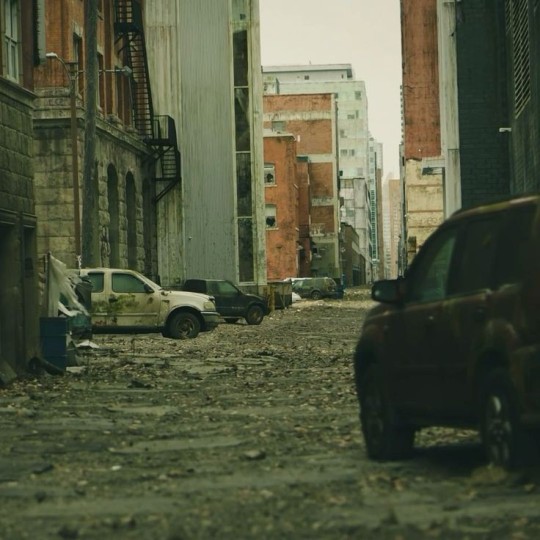
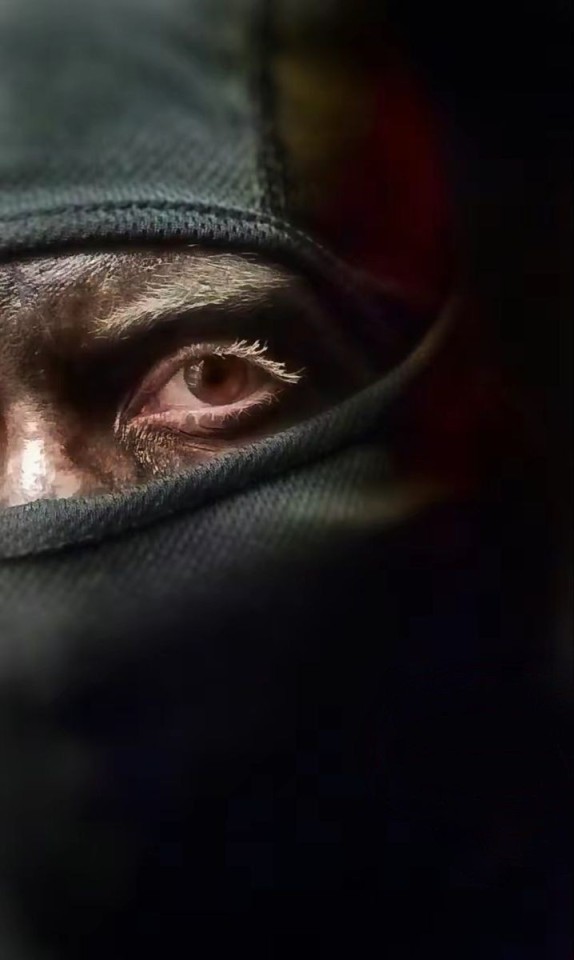
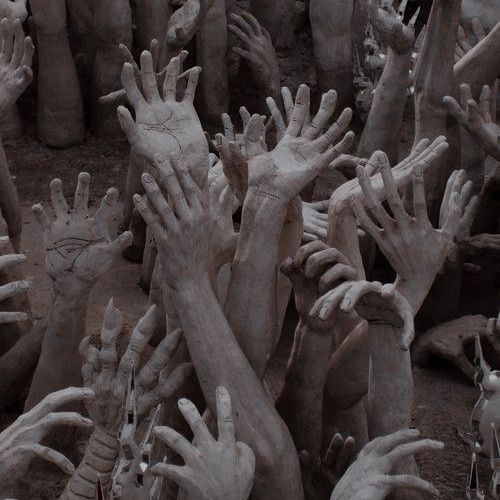
#ghost cod#simon ghost riley#simon ghost riley x reader#cod#cod x reader#fanfic#simon riley#simon riley x reader#soap x reader#soap cod#john soap mactavish#captain john price#gaz cod
21 notes
·
View notes
Text
Random Doctor Who Facts You Might Not Know, Part 25
Josie Day was a companion of the Eighth Doctor. She was a living painting, commissioned to capture the likeness of Lady Josephine, but she was so rich in animae particles that she became alive.
The Valeyard took on the identity of Jack the Ripper. While committing the famous murders, the Valeyard used the Dark Matrix to corrupt the other Doctors.
Ace was almost the sixth Ripper victim.
The Man with the Rosette (or, the Master) gave Scarlette rings to use for her and the Doctor’s wedding. He also sat in on the wedding on the side reserved for the Doctor’s family.
The Fifth Doctor is so scared of spiders that he will freeze in place and make Peri get rid of it.
The Saxon Master thought that the sun on the Mondasian Colony Ship would look the same as the sun in the Teletubbies.
The First and Second Doctors were both colorblind, but the Doctor did not realize this until they became the Third Doctor.
The Eighth Doctor spent a lot of time during the Coronavirus lockdown baking. He eventually managed to make a banana bread that wasn't disgusting. It was quite good actually.
After getting bored of baking, he started making a lot of face masks. He superimposed people's faces on them, so they could tell who each mask belonged to. Very few people accepted them when he offered them.
Once he got bored of that and ran out of other hobbies, he ran away to go live alone in his grounded TARDIS for many months.
The Master once set up a talent show called Make a Star. It was an anagram for aka Master.
The Ninth Doctor was petrified by the Incorporation on Occasus. He tried to regenerate to escape but couldn't. The Incorporation wanted his artron energy to bring back their kind and tortured him for 89 years to do so. Even after he regained the ability to move, he continued to go through the wringer in this story.
In that same story, he got so close to dying that another consciousness - himself as a failsafe on the brink of death - spoke to him.
The laws of probability bend around Time Lords, often tipping odds in their favor.
The politically correct term for a Silurian is an Earth Reptile.
The Sword of Never is a weapon used to execute Time Lord criminals. It renders all regeneration useless.
After one of the destructions of Gallifrey, the Eighth Doctor was dying. He was vomiting black bile, falling unconscious, generally looking like death warmed over, etc. This was only cured when Sabbath ripped his second heart - his connection to his Homeworld - from his body, but the Doctor immediately started screaming when he did this.
The Doctor is known as Karshtakavaar by the Draconians. It means the Oncoming Storm.
Harry has been known to bring the Fourth Doctor jelly babies from the shop because he knows he likes them.
Ace was once betrothed to a Traveller named Jan. The Seventh Doctor sacrificed him to defeat the Hoothi, and Ace's affection for the Doctor turned to so much hatred that she left the TARDIS.
Osgood has several tattoos of the Doctor’s faces.
Part 1, 2, 3, 4, 5, 6, 7, 8, 9, 10, 11, 12, 13, 14, 15, 16, 17, 18, 19, 20, 21, 22, 23, 24, 25, 26, 27, 28
#doctor who#dw#dr who#classic who#new who#eighth doctor#fifth doctor#big finish#sixth doctor#big finish doctor who#big finish audios#dw eu#doctor who eu#doctor who expanded universe#seventh doctor#ace mcshane#fourth doctor#harry sullivan#ninth doctor#the master#the valeyard#peri brown#saxon master#simm!master#tardis#time lords#first doctor#second doctor#third doctor#petronella osgood
92 notes
·
View notes
Text
Alright, due to popular request, I bring you the break down of the Taiwan Disease Personifications. Also, just so y’all know, the official explanations for the designs are not easy to find, so a lot of this is just from what I notice and what I know about the diseases
To start off, we have everyone’s favorite disease: COVID-19

So, this is one of the designs where I could actually find the artist explanation, so I will be including that information plus a couple things I noticed and how I think it fits the disease. So let’s start with to crown. The reason for the inclusion of the crown is the reflect the name coronavirus, corona being the Latin word for crown. The face is partially obscured because of COVID’s tendency to hide itself. The bean bag chair that they are sitting on has many protrusions signifying the spike proteins. The different digital devices represent how the world went virtual during the pandemic and the news channels behind them represent the media’s freak out when COVID was at its height. The floor has an outline of the world because everywhere was affected by the pandemic. Also, if you look closely, they are wearing little Covid earrings.
Next up, we got Zika:

I could not find an official artist statement for this design, so take my explanation with a grain of salt. So first off the red waist band reminds me of the red stripe that goes down the abdomen of the mosquito species that spreads Zika after it has fed. Also, the white markings on the black are also a characteristic of this species of mosquito. In fact, the design is the stripes on the chest look like the markings these mosquitoes have on their back. She presents female because it’s the female mosquitoes that bite and spread diseases. Her sleeves look like mosquito wings once again a reference to mosquitoes being the primary vectors of Zika. The area behind her has palm fronds to represent that Zika is a disease typically found in tropical climates.
Next up we have: Hansen’s Disease (aka Leprosy)

This is one where I could find the artist statement due to it being a pretty recent one, however, I will say that at least the translation was a bit lacking in describing the reasoning of every detail. She is a mask maker because leprosy changes how people perceive those who are infected but it is something that can easily be removed with modern antibiotics. She has different accessories like the lion and crocodile headpiece that implicate the divine involvement because leprosy has been historically thought to be a punishment of the gods. The scales on her arm look like an allusion to the scaling pattern scars that those with leprosy would develop.
Next up: Rubella

After a lot of digging I found the official profile for this design but it didn’t really explain the design choices so we are going to do more analysis on my end. So the pomegranate and the red dots represent the red rashes that come with rubella infections. The glasses I assume are to show how Rubella can lead to Congenital Rubella Syndrome (CRS) which can occur in children if their mother had rubella while pregnant. One of the symptoms that comes with CRS is cataracts.
Next up: the plague

I found the explanation on this and it just confirmed my own suspicions for certain design choices. So her design is very focused on death and mysticism because of how the Black Plague led to a lot of cultural focus on these two ideas. Behind her are old coins because of the economic impact the plague had on the civilizations of its time. The references to death are the skeletal pattern on her dress, and the scythe behind her and on her belt. The references to mysticism include the tarot cards she is holding and the crosses on her hat. On the tarot cards are designs referencing the three different forms the plague takes (bubonic, septicemic, and pneumonic) as well as a posey which was used to try to ward of the plague in old times. On her hat is also a collection of plague doctor masks which is pretty self explanatory as to how that connects.
Next up: Ebola

I couldn’t find the official explanation for this disease, so this is mostly speculation based on my analysis. Her outfit is red because of the hemorrhaging that comes with the disease. Specifically he lips are red because one of the more unique characteristics of Ebola is hiccuping up blood. The accessories seem to be inspired by central and western african traditional jewelry. There appear to be tribal masks on the necklace, I am not well versed in African art unfortunately, so any deeper meaning of these accessories are unfortunately lost on me. There are bats on the headdress because of bats being the natural host of Ebola. Her design is rather demonic because Ebola was so terrible for the areas affected, that people thought it could be caused be some great evil. The skulls are because of the extremely high death rate that comes with ebola. The leaves and fruits shown come from the African jungles which is typically where Ebola outbreaks start.
Next up: Novel Influenza A Virus Infections
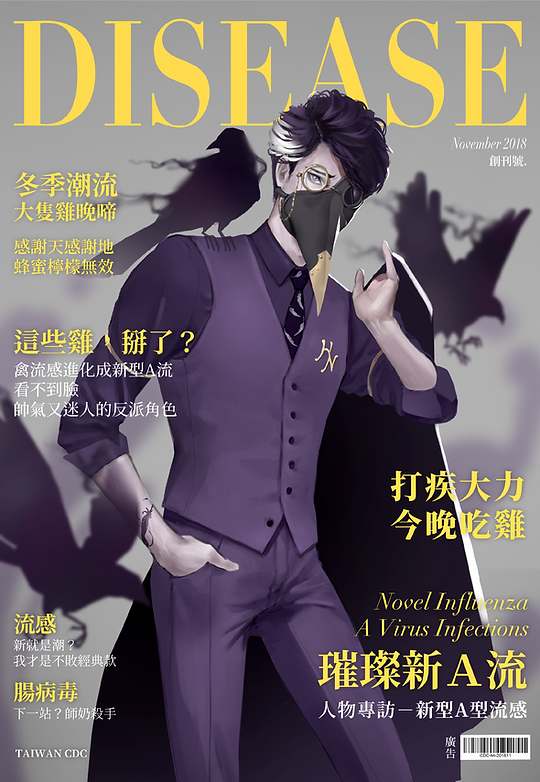
I actually found the artist explanation for this design! As a disease closely associated with birds, there are many elements linked to birds. There are many bird shadows, the hair that looks like feathers, and the beak shaped mask, feathers on his tie and a feather tattoo on right arm, and the “H-N” pin (H and N proteins of the influenza virus).
Next up: Dengue Fever

Another one with an artist statement! Since only female mosquitoes bite, the character is set as a female. Her dark red lips represent mosquito’s instinct to bite, and she is holding a poisonous thornapple flower. She has mosquito wings tattooed on her back and thornapple flower tattooed on her arm. I have spent a long time looking into how the thornapple flower relates to dengue, but I haven’t had a lot of luck. From what I have seen is that the roots, seeds, and leaves are used in some traditional medicines, including treatments for malaria, but I have not had luck finding how it is connected to Dengue specifically.
Next up: Japanese Encephalitis

I found the artist statement for this disease as well. The disease is visualized into three characters that form a pop group, with their names reflecting the 3 main Culex mosquito species that spread Japanese encephalitis in Taiwan, which are Culex tritaeniorhynchus (Three), Culex annulus (Ring), and Culex fuscocephala (Shiro). They wear black and white, like the colors of the Culex mosquitoes. Red accessories represent their love for blood. I don’t have much to add outside of the artist explanation.
Last one for now is: Rabies

I found the explanation for this one, but it is not descriptive at all, so I am going to be going into every detail because this is Rabies. The spikes on the jacket and pant legs represent the protein spikes rabies uses to infect nerves. The blue jacket and gloves are representing water as one of the unique characteristics of rabies is hydrophobia (physical repulsion to water). The claw marks on the shirt show the animalistic tendencies the virus brings out. The violin players in the animal mask show how the virus can hide in these animals. The personification of rabies is holding a conductor’s wand showing how rabies controls those who are infected. The teeth necklace shows how it spreads through bites and they are standing on the brain because that is what rabies infects. He has a chain with mammal skulls once again tying back to rabies being a fatal mammalian disease. The belt buckle has a bone on it as bone are associated with bones and rabies is associated with dogs.
#centers for disease control#covid#Zika#hansen’s disease#leprosy#rubella#plague#ebola#influenza#novel influenza a virus infection#japanese encephalitis#rabies#blood mention#taiwan cdc#personified diseases#long post
186 notes
·
View notes
Text
Sometimes it genuinely feels like people forget it's not only trans fems that experience transphobia. I'm not talking about "listen to trans fems about their experiences and protect them" I'm talking about "my friend was just misgendered. LISTEN UP TMEs CAUSE YOU NEVER EXPERIENCE THIS" like hold up, what? Do you think ALL transphobia only affects trans fems?? What the fuck are you talking about? Is this the 1990s when trans groups were more insular and many queer people thought it was only trans fems that existed as trans because "why would someone want to be a man" and people didn't believe in/know about nonbinary people? What the fuck are you talking about???
To be clear: transmisogyny exists, it's terrible and insidious and it's everywhere. That doesn't mean that other trans people aren't attacked and raped and regulated out of places and denied access to medical care and forced to be sterilized etc.
As a black person, the thing I'm talking about feels like how some of my relatives will say shit like "no other race knows what it's like to be denied access/put at risk for their skin colour" where I'm like. Hello. Hi. What the fuck. Do you think it's a weird coincidence that residential schools existed and that there are so many missing and murdered Indigenous women and that east Asians were being physically and violently assaulted because """they caused coronavirus""""?
22 notes
·
View notes
Text
{ MASTERPOST } Everything You Need to Know about Repairing Our Busted-Ass World
On poverty:
Starting from nothing
How To Start at Rock Bottom: Welfare Programs and the Social Safety Net
How to Save for Retirement When You Make Less Than $30,000 a Year
Ask the Bitches: “Is It Too Late to Get My Financial Shit Together?“
Understanding why people are poor
It’s More Expensive to Be Poor Than to Be Rich
Why Are Poor People Poor and Rich People Rich?
On Financial Discipline, Generational Poverty, and Marshmallows
Bitchtastic Book Review: Hand to Mouth by Linda Tirado
Is Gentrification Just Artisanal, Small-Batch Displacement of the Poor?
Coronavirus Reveals America’s Pre-existing Conditions, Part 1: Healthcare, Housing, and Labor Rights
Developing compassion for poor people
The Latte Factor, Poor Shaming, and Economic Compassion
Ask the Bitches: “How Do I Stop Myself from Judging Homeless People?“
The Subjectivity of Wealth, Or: Don’t Tell Me What’s Expensive
A Little Princess: Intersectional Feminist Masterpiece?
If You Can’t Afford to Tip 20%, You Can’t Afford to Dine Out
Correcting income inequality
1 Easy Way All Allies Can Help Close the Gender and Racial Pay Gap
One Reason Women Make Less Money? They’re Afraid of Being Raped and Killed.
Raising the Minimum Wage Would Make All Our Lives Better
Are Unions Good or Bad?
On intersectional social issues:
Reproductive rights
On Pulling Weeds and Fighting Back: How (and Why) to Protect Abortion Rights
How To Get an Abortion
Blood Money: Menstrual Products for Surviving Your Period While Poor
You Don’t Have to Have Kids
Gender equality
1 Easy Way All Allies Can Help Close the Gender and Racial Pay Gap
The Pink Tax, Or: How I Learned to Love Smelling Like “Bearglove”
Our Single Best Piece of Advice for Women (and Men) on International Women’s Day
Bitchtastic Book Review: The Feminist Financial Handbook by Brynne Conroy
Sexual Harassment: How to Identify and Fight It in the Workplace
Queer issues
Queer Finance 101: Ten Ways That Sexual and Gender Identity Affect Finances
Leaving Home before 18: A Practical Guide for Cast-Offs, Runaways, and Everybody in Between
Racial justice
The Financial Advantages of Being White
Woke at Work: How to Inject Your Values into Your Boring, Lame-Ass Job
The New Jim Crow, by Michelle Alexander: A Bitchtastic Book Review
Something Is Wrong in Personal Finance. Here’s How To Make It More Inclusive.
The Biggest Threat to Black Wealth Is White Terrorism
Coronavirus Reveals America’s Pre-existing Conditions, Part 2: Racial and Gender Inequality
10 Rad Black Money Experts to Follow Right the Hell Now
Youth issues
What We Talk About When We Talk About Student Loans
The Ugly Truth About Unpaid Internships
Ask the Bitches: “I Just Turned 18 and My Parents Are Kicking Me Out. How Do I Brace Myself?”
Identifying and combatting abuse
When Money is the Weapon: Understanding Intimate Partner Financial Abuse
Are You Working on the Next Fyre Festival?: Identifying a Toxic Workplace
Ask the Bitches: “How Do I Say ‘No’ When a Loved One Asks for Money… Again?”
Ask the Bitches: I Was Guilted Into Caring for a Sick, Abusive Parent. Now What?
On mental health:
Understanding mental health issues
How Mental Health Affects Your Finances
Stop Recommending Therapy Like It’s a Magic Bean That’ll Grow Me a Beanstalk to Neurotypicaltown
Bitchtastic Book Review: Kurt Vonnegut’s Galapagos and Your Big Brain
Ask the Bitches: “How Do I Protect My Own Mental Health While Still Helping Others?”
Coping with mental health issues
{ MASTERPOST } Everything You Need to Know about Self-Care
My 25 Secrets to Successfully Working from Home with ADHD
Our Master List of 100% Free Mental Health Self-Care Tactics
On saving the planet:
Changing the system
Don’t Boo, Vote: If You Don’t Vote, No One Can Hear You Scream
Ethical Consumption: How to Pollute the Planet and Exploit Labor Slightly Less
The Anti-Consumerist Gift Guide: I Have No Gift to Bring, Pa Rum Pa Pum Pum
Season 1, Episode 4: “Capitalism Is Working for Me. So How Could I Hate It?”
Coronavirus Reveals America’s Pre-existing Conditions, Part 1: Healthcare, Housing, and Labor Rights
Coronavirus Reveals America’s Pre-existing Conditions, Part 2: Racial and Gender Inequality
Shopping smarter
You Deserve Cheap Toilet Paper, You Beautiful Fucking Moon Goddess
You Are above Bottled Water, You Elegant Land Mermaid
Fast Fashion: Why It’s Fucking up the World and How To Avoid It
You Deserve Cheap, Fake Jewelry… Just Like Coco Chanel
6 Proven Tactics for Avoiding Emotional Impulse Spending
Join the Bitches on Patreon
#poverty#economics#income inequality#wealth inequality#capitalism#working class#labor rights#workers rights#frugal#personal finance#financial literacy#consumerism#environmentalism
556 notes
·
View notes
Text
Back in early 2020, the news of the strange illness causing terrible pneumonias in China saddened me, but I believed I was safe in Canada. Within weeks, there was a reckoning: thousands were dying on my doorstep, too.
Directors of an independent living residence at the start of the pandemic asked me to become the residence’s COVID-19 advisor. They had no qualified medical staff, despite supporting elderly residents. Back in those early days, anyone with a medical qualification was commandeered to help in any way they could.
Confronted with the task of providing guidance to the nonmedical staff taking care of these residents, I decided to learn everything I could about the pandemic. At that time, about 1,000 papers were being published every month detailing research into every aspect of the coronavirus. Of course, I couldn’t read all of them, but I read as many as I could and built a breadth and depth of evidenced-based knowledge about SARS-CoV-2 and COVID-19. I wrote up the protocols and during my tenure as COVID-19 Advisor for this residence, we kept COVID out.
As a family physician seeing COVID-19 in my practice, I came to recognize that so many of my colleagues and patients had no idea how to keep themselves safe from the coronavirus, nor were they aware of its long-term risks. I saw the need to take action and effect change, which ultimately led me to becoming an advocate for Long COVID awareness.
I started the medical education company Kojala Medical, aiming to provide evidenced-based information about medical issues in a form patients could understand and reliably trust. I wanted a credible, trustworthy site to which I could refer my patients, colleagues, friends and family. We started with a focus on COVID-19 and have now expanded to Long COVID, with the site longcovidtheanswers.com.
I first learned about Long COVID in 2020 through publicity raised by the Body Politic COVID-19 support group, then became more alarmed as I read scientific articles about the disease.
Aside from the official death toll of over 7 million from COVID-19, Long COVID has emerged from the pandemic as the single biggest disaster to afflict humanity, yet very few people who are not sick with Long COVID are aware of it, want to know about it, believe in it, or even acknowledge that it’s happening. Sadly, many in the medical profession fall within that group of non and disbelievers.
This is bizarre, especially because of the impact of the disease. One recent review estimates more than 400 million global cases of Long COVID. I am furious that not enough is being done to alleviate this suffering. The injustice of yet another neglected and marginalized chronic illness that disproportionately affects women.
So, rather than sitting around waiting for ‘someone’ or ‘body’ to do something, I decided to act.
For me, medicine is fundamentally about aiding people to get as well as possible from any sickness they have — and even more importantly, preventing people from getting sick in the first place. In both of these regards, we are failing people with Long COVID dismally.
Long COVID is not the flu, it is a multisystem debilitating infection associated chronic condition. Developing Long COVID can be disabling and life-changing. Recovery remains low — and some manifestations like heart disease, dysautonomia, and myalgic encephalomyelitis (ME) may last a lifetime.
This is a terrifying situation to be in when, as a global community, we have chosen to act as though the pandemic is over and repeatedly expose ourselves to SARS-CoV-2, a grade 3 biohazard, with little to no protection.
As I read more and more research papers about Long COVID and looked at the inaction of global governments and my own profession, I feared that we were sleepwalking into a global mass disabling event unnecessarily, since we have many technologies available to prevent this.
Infection-associated chronic conditions do not have an established medical speciality, and are rarely taught in medical school. With the medical profession disengaged, people with Long COVID have been left to find answers for themselves.
My work aims to build on support groups, which have helped establish caring communities for people with Long COVID, but have also paved the way for us as scientists and medics to change the way we conduct research in a more patient-focused way. Nevertheless, they don’t entirely fulfill the need for evidence-based information about the disease in a readable format for nonmedical individuals.
I saw a huge need for a comprehensive website that would be of use to all people with Long COVID, their caregivers, the scientists researching the disease, and the multidisciplinary team of healthcare professionals that would be needed to rehabilitate them. Our organization believes that Long COVID The Answers meets those requirements.
There is also a pressing need to train medical professionals so that they will acknowledge Long COVID and feel confident about diagnosing and managing it. Inspired by an interview with Dr. Ric Arsenaeau, an expert in managing complex chronic diseases, my team and I created a podcast series: so that medical providers can receive continuing professional development/educational credits from watching this series.
The podcast series features a range of experts, including people with Long COVID, doctors, scientists, educators, and medical clinicians. Some of these experts also serve on our advisory board, overlooking and participating in the project.
Our site aims to raise awareness about the dangers of continuously exposing ourselves to a perilous virus with no thought of what it will cost us and our children.
This will mobilize the people of the world to demand that their leaders properly provide safe spaces for us all to prevent us from ever getting infected in the first place.
We need to mandate our governments to access all the mitigating technologies that we have in our roster, not only vaccination. The best way of managing Long COVID is to prevent people getting infected with SARS-CoV-2 in the first place!
We need national and international indoor clean air acts – to protect us from emerging pathogens.
For people with Long COVID, awareness will bring an educated and mobilized medical profession, governmental resources, financial and sociological support, and money for research — to facilitate treatments and, hopefully, a cure.
These are the main reasons why I jump out of bed in the morning with gusto, focus, and determination, and why I’ve poured all my money and my time into educating people about Long COVID.
Dr. Funmi Okunola is a British Family Physician who lives and works in Vancouver, Canada. She is the President and CEO of Kojala Medical, a digital medical education company behind COVID-19 The Answers and Long COVID The Answers.
#long covid#covid#mask up#pandemic#covid 19#wear a mask#sars cov 2#public health#coronavirus#still coviding#wear a respirator
254 notes
·
View notes
Text

Stranded student helps design synthetic polymers to combat fungal infections
Every year, more than 2 million people are affected by invasive fungal infections, which are often caused by Candida species and are associated with high mortality rates. The development of new therapies is progressing very slowly. Demand is increasing, however, especially as drug resistance is becoming more and more common. An interdisciplinary research team led by Dr. Sascha Brunke from the Leibniz Institute for Natural Product Research and Infection Biology–Hans Knöll Institute (Leibniz-HKI) has now investigated the mode of action and therapeutic potential of synthetic polymers. These long-chain chemical compounds mimic naturally occurring peptides and inhibit the growth of microorganisms. The exact mechanism of action was previously unclear. However, the mystery has now been solved—all thanks to the coronavirus pandemic.
Read more.
17 notes
·
View notes